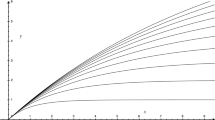Abstract
Population ethics contains several principles that avoid the repugnant conclusion. These rules rank all possible alternatives, leaving no room for moral ambiguity. Building on a suggestion of Parfit, this paper characterizes principles that provide incomplete but ethically attractive rankings of alternatives with different population sizes. All of them rank same-number alternatives with generalized utilitarianism.
Similar content being viewed by others
References
Blackorby C, Bossert W, Donaldson D (1995) Intertemporal population ethics: Critical-level utilitarian principles. Econometrica 63: 1303–1320
Blackorby C, Bossert W, Donaldson D (1994) Intertemporally consistent population ethics: Classical utilitarian principles. In: Arrow K, Sen A, Suzumura K (eds.) Social Choice Examined. McMillan, London (in press)
Blackorby C, Donaldson D (1977) Utility vs equity: Some plausible quasi-orderings. J Public Econ 7: 365–381
Blackorby C, Donaldson D (1984) Social criteria for evaluating population change. J Public Econ 25: 13–33
Blackorby C, Donaldson D (1991) Normative population theory: A comment. Soc Choice Welfare 8: 261–267
Blackorby C, Donaldson D (1992a) The value of living: A comment. Rech Econ Louvain 58: 143–145
Blackorby C, Donaldson D (1992b) Pigs and guinea pigs: A note on the ethics of animal exploitation. Econ J 102: 1345–1369
Broome J (1991) Weighing goods. Basil Blackwell, Oxford
Broome J (1992a) The value of living. Paper presented at the symposium on the value of life, Louvain-la-Neuve, December 1991. Rech Econo Louvain 58: 125–142
Broome J (1992b) Reply to Blackorby and Donaldson, and Drèze. Rech Econ Louvain 58: 167–171
Broome J (1992c) Counting the cost of global warming. White Horse, Cambridge
Dasgupta P (1988) Lives and well-being. Soc Choice Welfare 5: 103–126
Diewert W (1993) Symmetric means and choice under uncertainty. In: Diewert W, Nakamura A (eds) Essays in index number theory, volume 1 North-Holland New York, pp. 355–434
Griffin J (1986) Well-being: Its meaning, measurement, and moral importance. Clarendon Press, Oxford
Hammond P (1988) Consequentialist demographic norms and parenting rights. Soc Choice Welfare 5: 127–146
Hammond P (1994) Consequentialist decision theory and utilitarian ethics. In: Farina F, Hahn F, Vannucci S (eds.) Ethics, rationality, and economic behaviour. Oxford University Press, Oxford (forthcoming)
Kolmogoroff A (1930) Sur la Notion de la Moyenne. Atti della Reale Accademia Nazionale dei Lincei, Rendiconti 12: 388–391
McMahan J (1994) Nonconception and early death. University of Illinois, mimeo
Morton A (1994) Two places good four places better. University of Bristol, mimeo
Nagumo M (1930) Über eine Klasse der Mittelwerte. Japanese J Math 7: 71–79
Narveson J (1967) Utilitarianism and new generations. Mind 76: 62–72
Parfit D (1976) On doing the best for our children. In: M. Bayles (ed.) Ethics and Populations. Schenkman, Cambridge
Parfit D (1982) Future generations, further problems. Philos Public Affairs 11: 113–172
Parfit D (1984) Reasons and persons. Oxford University Press, Oxford
Sen AK (1970) Collective Choice and Social Welfare. Holden-Day, San Francisco
Sen AK (1991) Welfare economics and population ethics. Paper prepared for the Nobel Jubilee Symposium on Population, Development, and Welfare at Lund University, December 5–7, 1991
Sikora RI (1978) Is it wrong to prevent the existence of future generations? In: Sikora RI, Barry B (eds.) Obligations to Future Generations, Philadelphia, Temple
Author information
Authors and Affiliations
Additional information
This paper was presented to the conference Incommensurability and Value, Château du Baffy, Caen, April 1994, and an earlier version was presented at the Applied Ethics Centre of the University of British Columbia. We are indebted to John Broome, whose comments inspired this paper, Alan Gibbard, James Griffin, Peter Hammond, Adam Morton, Klaus Nehring, and conference and seminar participants for comments and suggestions. Financial support through a grant from the Social Sciences and Humanities Research Council of Canada is gratefully acknowledged
Rights and permissions
About this article
Cite this article
Blackorby, C., Bossert, W. & Donaldson, D. Quasi-orderings and population ethics. Soc Choice Welfare 13, 129–150 (1996). https://doi.org/10.1007/BF00183348
Received:
Accepted:
Issue Date:
DOI: https://doi.org/10.1007/BF00183348



